“Nobody could have held it against the guides at Eigergletscher Station if they had refused to take a single step onto the Face when they heard of the accident. But there was one man still alive. They were all determined to rescue him, to snatch him, if possible, from the clutches of that fatal wall.”
— Heinrich Harrer, The White Spider
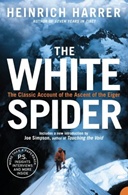 |
The White Spider by Heinrich Harrer A very good mountaineering book by one of the men who made the first ascent of the Eiger’s treacherous North Face in 1938. Most of the book was written in 1958-1959, at a time when only a few additional successful ascents had been made, and it includes a detailed recounting of all attempts to scale the North Face between 1936 and 1957, some of which were infamously unsuccessful.Many of these young men were German and Austrian, but Hitler and World War II does not intrude on Harrer’s narrative — he is totally focused on mountain climbing and seems apolitical. I only mention this because the popular 2008 movie North Face, about the unsuccessful 1937 attempt in which all four climbers died, gave me a sense that Nazism and the looming war were an important part of the backdrop. Reading between the lines of Harrer’s account, the climbers appear to have paid no attention to it at all. The White Spider is a fascinating account, a great story of old-school mountaineering, engagingly written. |
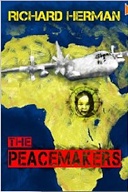 |
The Peacemakers by Richard Herman Most of Herman’s novels (I’ve read them all, by the way … he and I are squadron mates and good friends, and moreover I like his writing) center on embattled, isolated US Air Force units operating in international trouble spots, and most are topical. This one, for example, is about the men and women of a C-130 detachment providing refugee relief and resupply in the Sudan, constantly set upon by Khartoum, corrupt UN officials, the Janjaweed, the Sudanese Army … and backstabbing political opposition at home, both military and civilian. His stories are always exciting and fast reads. This one is no exception. I found The Peacemakers to be somewhat repetitive, though. As an example, characters discuss the injurious effect of sexual pair bonding on combat units not once but several times throughout the novel … to no real effect, since the main characters are constantly doing exactly that. The commander, Lt Col Allston, lives by a few maxims (“When the going gets tough, get aggressive”) and never tires of repeating them … by the final chapters, his underlings are quoting his maxims right back at him, and not in an ironic way. I think Herman got a little carried away with the slogans; in places they’re so thick it’s almost cheerleading. As Chekhov said, “One must not put a loaded rifle on the stage if no one is thinking of firing it.” Herman usually fires off his loaded rifles, and in light of that I was disappointed he didn’t follow up on his teenaged Janjaweed’s vow to kill his mother and sister for dishonoring the family name … a vow taken right at the beginning of the novel, and for whatever reason not mentioned again. Did he kill ’em? Still, an exciting story, with the smell of JP-4 wafting from every page. If you’re a military aviation enthusiast, this one will excite you. If you’re a trash hauler, this one will make you proud. If you hate the glassy-eyed politically connected (and politically correct) careerists who have taken over the Air Force, you will be delighted by Herman’s old school shit hot kick the tires and light the fires attitude. |
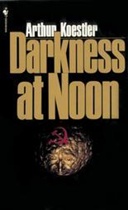 |
Darkness at Noon by Arthur Koestler I recently read a couple of novels about Soviet life in the Stalin era. Reviewing them, I suddenly realized I’d never read Arthur Koestler’s famous novel about the Moscow show trials of the late 1930s, Darkness at Noon.I remember Darkness at Noon, published in 1940, still being controversial when I was in college in the 1960s. Hard-core leftists, sympathetic to the Soviet Union, despised it as the work of a quisling. Campus conservatives regarded it as required reading. My impression (since confirmed, if Wikipedia is to be believed) was that Orwell drew from it in writing 1984. Well, now I have read it. Frankly, I thought it dry and uninteresting … perhaps quite daring in its day, but no longer. Today we can read any number of books about life under Stalin, from Solzhenitsyn’s The Gulag Archipelago to Tom Rob Smith’s Child 44, some of Alan Furst’s Night Soldiers novels, William Vollman’s Europe Central. Martin Cruz Smith’s Arkady Renko novels, though set in the post-Stalin era, also come to mind, because the state apparatus that constantly threatens Renko grew out of Stalinism. And of course there’s always Orwell’s 1984. Any of these works, non-fiction or fiction, bring the horror to life far more vividly than Darkness at Noon. Why do I say Darkness at Noon was daring in its day? Partly because of the strong opinions about it I encountered in college: if hard-core commies still hated Koestler in the 60s, imagine how they hated him in the 40s, when so many leading leftist intellectuals made it their business to defend and protect the Soviet experiment. Partly because Koestler himself seemed terrified of Stalin and the Soviet Union. He pussyfoots around historical facts that at the time must have been blazoned across the front pages of newspapers everywhere outside the CCCP: he never names Russia or the Soviet Union, never names any actual victims of show trials, never names Lenin, never names Stalin (who lurks in the background as “No. 1”), never calls communism by its name. He never even says the words “Germany” or “Hitler” though they, too, are an important part of the novel’s backdrop (the closest he comes is a single reference to the “man with the black moustache”). Rubashov, the imprisoned protagonist, is a cardboard cutout, an amalgam of the old Bolshevik revolutionaries put to death by Stalin. There’s barely any action as most of us would define it: the entire novel takes place inside the prison where Rubashov is held, with the story coming out through a mixture of interrogation sessions, tap code messages on the prison grapevine, and solitary reminiscences. Rubashov’s story is of course an interesting one, but it lacks suspense — we know from page one the outcome is scripted and inevitable: Rubashov will be forced to confess to crimes he didn’t commit, then executed. We learn, unsurprisingly, that Rubashov himself was quite the bad-ass commie himself, consigning many to their deaths. We watch, unsurprised, as Rubashov convinces himself there’s no point in fighting his sham trial, even accepting his interrogators’ instructions to abase himself in front of the peoples’ prosecutor “for the good of the revolution.” There’s no doubt Darkness at Noon was a hot read in the 1940s, when Koestler was one of the first influential writers to renounce communism and turn against Stalin. Those passions are mostly dead today. There are many true and fictional accounts of the Stalin era, most of them far more gripping than this one. Today, I’m afraid Koestler’s groundbreaking novel has become an academic footnote … an important one, surely … but it’s no 1984. |
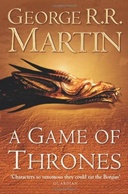 |
A Game of Thrones (A Song of Ice and Fire) by George R.R. Martin I thought I’d outgrown this sort of thing. I’m happy to report I have not! This is the first book of what promises to be a grand, multi-generational adventure on the order of The Lord of the Rings. It is more adult than other aristocratic adventure stories, in that George R.R. Martin imbues his villains with realistic motives (mostly spite, greed, and a lust for power) and he doesn’t hesitate to give his characters sex lives. The action’s set in a fictional world somewhat resembling that of King Arthur, but it is a constrained world surrounded by terra incognita, full of menace. It is also a supernatural world, in that there are dragons. The menace and the supernatural are a constant presence, but don’t really manifest themselves in this first volume, which is the story of an aristocratic northern family pulled into the court intrigues of an ineffectual king with a truly malign queen behind him.If there is anything about this book that puts me off, it is the abundance of courtly knight-speak, but by golly the action never lets up and I kept turning pages to see what happened next. I haven’t been this wrapped up in an adventure story since, well, The Lord of the Rings! Great stuff! I have the second volume on my Nook now and it is all I can do to resist abandoning the books I’ve promised to read first and skipping ahead to A Clash of Kings. |
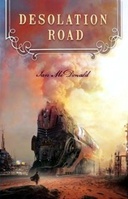 |
Desolation Road by Ian McDonald Not rated because I abandoned it halfway through. The quality of the writing is high but the quality of the story is low; were I to rate it I would give it two stars.I’m very disappointed. I recently read Ian McDonald’s novel The Dervish House and thought I’d found a new author to recommend to all my friends. But this novel? What purports to be science fiction is magical realism run amok: sadly, in terms of my regard for Ian McDonald, a genre I loathe. While McDonald’s writing is friendly and engaging, his story here, so unlike Dervish House, said nothing to me … what I read was page after page of inconsequential fluff. I read this as a Nook book, and like so many ebooks, it’s filled with typos and errors, more than enough to make reading it an unpleasant experience … I feel ripped off by the publisher. I simply cannot get over the contrast between Desolation Road and Dervish House. It is as if they were written by two different authors. |
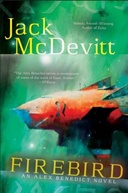 |
Firebird (an Alex Benedict mystery) By Jack McDevitt I’ve been looking at other readers’ reviews, and I’m afraid I have to cast a dissenting vote on Jack McDevitt’s Firebird. I thought, based on the jacket blurb, this novel would deliver some hard science fiction, but the science wasn’t there and the fiction was below average.Firebird opens with an interstellar ship inexplicably failing to arrive at its destination, then introduces the mysterious disappearance of a physicist who had been researching the disappearance of other interstellar ships and who may have found a way to move between long-suspected alternate universes. The action occurs in a far distant future, some 15,000 or more years from now, when mankind inhabits several planets. It’s a promising start. But then the science fiction fizzles out. Disappointingly, nothing about the society of the distant future is in any way different from today. Male-female relationships and roles are the same. Popular media, astoundingly, apparently hasn’t advanced beyond television, with the same familiar hosts and talk show formats. The state of government, politics, military, religion, and commerce is that of any current western democracy. People live in communities we’d find familiar and comfortable. Science and knowledge … the pursuit of a unified field theory, attempts to prove the existence of parallel universes, the science of quantum physics and black holes … has advanced not one inch from today. Nothing has changed in 15,000 plus years except for the unexplained development of hyperspace drives, anti-gravity, and artificial intelligence. The story itself is pop detective fiction, more concerned with making us like the antiquities dealer cum detective Alex and his female space pilot sidekick Chase. Reading Firebird is like watching an episode of The Rockford Files filmed on the bridge of the USS Enterprise. So forget the science fiction, which in this book is nothing more than a backdrop. How’s the detective story? It’s okay, but unnecessarily padded and plodding, taking way too long to get to the point and drifting off into sub-plots that don’t directly bear on the main plot and which are generally unresolved. The characterization? Jack McDevitt’s characters are as undeveloped as, and indistinguishable from, the various AI systems they talk to in their homes, offices, and spacecraft. There are several human and AI characters in the novel, but it’s hard to keep them straight because they’re all pretty much the same. When it comes to the two main characters, Alex and Chase, I never came to know them at all. I can’t even conjure up a mental image of what they might look like. Firebird pretends to be science fiction, but really it’s comfort food, undemanding and familiar. I suppose there’s an audience for this sort of thing, but I am not among their number. |
You never read Darkness at Noon until now? Good Lord, honey chile, I read it when I was fifteen or so. Oddly enough, I’ve been thinking about reading it again, although, after reading your review, I’m not so sure.
I like “insolating.” It refers to people who are having their shoes resoled. Or, in the “inflammable” sense, to those who are losing their soles, or possibly selling them, but now we’re getting too convolated (or convoluted, as you choose; or shoes).
And, yes, proofreading has gone out the window. The number of errors throughout even fairly pricey books is just shameful. Either the proofreaders don’t care, the editors never bother to check, or no one can tell the difference anymore, thanks to the severe decline in American education. Anyhow, just, like, y’know, de-pressing.